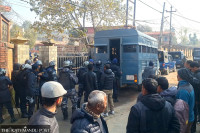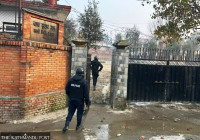Tue, Feb 17, 2026
Valley
Ruling party leaders say hosting Asia Pacific Summit was a mistake
Ruling party leaders have taken strong exception to the KP Oli government’s involvement in the Asia Pacific Summit that was hosted in Kathmandu from November 30 at the ongoing Standing Committee meeting of the Nepal Communist Party (NCP).
bookmark
Tika R Pradhan
Published at : December 20, 2018
Updated at : December 20, 2018 14:39
Kathmandu
Ruling party leaders have taken strong exception to the KP Oli government’s involvement in the Asia Pacific Summit that was hosted in Kathmandu from November 30 at the ongoing Standing Committee meeting of the Nepal Communist Party (NCP).
Leaders who spoke on Tuesday and Wednesday warned that the government’s role in the summit organised by the controversial South Korean non-government organisation Universal Peace Federation would cost the communist party dear next election unless the party leadership admits its mistake.
Leaders who’re known to be close to Madhav Nepal were critical of his involvement in the summit. Bhim Rawal, Surendra Pandey and Raghuji Pant were vocal in criticising the government and the party leadership for their all out support to the four-day event.
Pandey on Wednesday urged the party leadership not to defend the controversial summit. “Since we have already made the mistake by hosting the summit, we should not make another by defending it. The leadership should correct itself through self-criticism from this meeting,” said Pandey.
On Tuesday, Rawal argued that the government’s involvement in the summit, Prime Minister Oli receiving the $100,000 governance award without approval from the Cabinet were against the constitution, principles of the unified communist party and diplomatic norms. “It should be ensured that such mistakes do not repeat again,” reads Rawal’s five-page document.
Pant argued that involvement of the government and the party in the summit had delivered a negative message to the people. “This is a big mistake,” he said.
Despite knowledge that the South Korean organisation is accused of propagating religion and proselytising, the Oli government deployed the entire state apparatus and resources—on par with regional summits like those of SAARC and BIMSTEC—for the summit. PM’s foreign relation advisor Rajan Bhattarai travelled to a number of countries to invite foreign dignitaries on the prime minister’s behalf.
A section of NCP leaders including Oli, senior leader Nepal, Deputy Prime Minister Ishwar Pokhrel, and PM’s chief advisor Bishnu Rimal were engaged in managing the summit.
Nepal, who chaired the summit’s invitation committee, defended the event, arguing that the government was simply supporting the conference attended by leaders from all religions.
According to the Finance Ministry, the government spent Rs130 million on the summit. Of the total, Rs100 million was used for road repair in the Capital, Rs23 million for security mobilisation and Rs5.5 million for bilateral talks and welcoming high-level guests.
‘Secretariat can’t be core leadership’
Pandey was also critical of the political document that defined the nine-member party secretariat as the “core” leadership.
He charged the party with centralising the power on a few leaders in the name of core leadership.
“The secretariat should not be made the ultimate power centre,” said Pandey.
“In that case, it should be done through the party’s general convention.”
Call for Cabinet reshuffle
Amid public criticism of the government’s lacklustre performance, Pant demanded a Cabinet reshuffle. “Some of the ministers have courted controversies while others have failed to perform. They should be recalled,” he said. Pant urged Oli not to centralise the authority on the PM’s Office. “The prime minister’s job is to make the ministers active and accountable. It won’t do good if all the power is accumulated in the PMO,” he said.
Pandey said the government and the party leadership have failed to gauge geopolitics. He argued that removal of the Indian field office from Biratnagar in August could not be billed as an improvement in relations with India. He alleged that the NCP leadership had undermined the fact that Indian interests in Nepal haven’t changed.
“Although India was said to have opened four additional air routes for Nepal, it is yet to be implemented. The Indian government is still reluctant to accept the EPG [Eminent Persons Group]’s report. How can we say relations with the southern neighbour have improved,” he wondered.
Most Read from Valley
Editor's Picks
Upper house passes tourism bill with tougher Everest rules
What Routine of Nepal Banda gets right, and what it gets wrong
The murky business of room finding in Kathmandu
Nepal’s share market faces unprecedented lockdown as regulators battle industry over trading rules
Ministries differ over extending Indian HICDP aid beyond local governments
E-PAPER | February 17, 2026
×




 16.12°C Kathmandu
16.12°C Kathmandu











